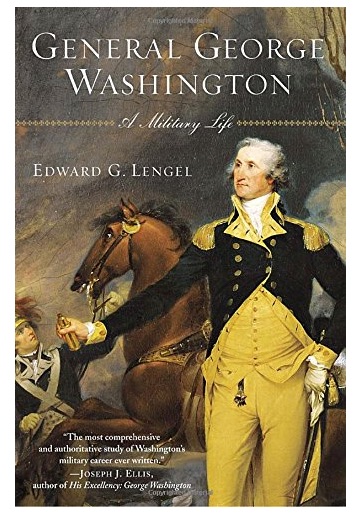In this Virginia History Blog we look at five titles related to George Washington and his wife, Martha Washington. “General George Washington” examines Washington’s military career, and “The Glorious Struggle” focuses on his correspondence during his command of the Continental Army in the Revolution. “Washington’s God” looks at Washington’s personal faith practice, his theology and his life outcomes.
“Martha Washington” is a biography and social history of the first First Lady, and “Experiencing Mount Vernon” reports accounts of visitors there from the writing of the Constitution, through Washington’s administrations and retirement to the time of the Civil War.
General George Washington

Edward G. Lengel wrote General George Washington: A Military Life in 2005. It is available from Random House, on Kindle and online new and used.
Washington made his reputation as a soldier, an amateur who learned on the job. This is a biography of Washington’s military life with a focus on Washington’s career. In addition to an appreciation of Washington’s personal bravery and field leadership at Monmouth and his hard work and compassion at Valley Forge, Lengel weighs Washington’s efforts as adequate, innovative and “harebrained”.
The book explores the interaction between what British commanders planned and did as well as Washington’s coordination and execution of military affairs. While there were superior contemporary strategists, tacticians and military administrators on both sides, Washington was indeed “the savior of his country”.
To buy “General George Washington” at Amazon, click here.
The Glorious Struggle

Edward G. Lengel edited The Glorious Struggle: George Washington’s Revolutionary War Letters in 2008. It is available from the Smithsonian Institute, on Kindle and online new and used.
Following his wartime biography of General George Washington: A Military Life (2005), here Lengel uses Washington’s correspondence to highlight his military contributions and leadership in the Continental Army for the duration of the Revolution, 1775-1783. This one-volume collection of letters include Washington’s planning and commentary on specific military actions, as well as reflections of the ebb and flow of American fortune over the eight year conflict. The reader can see how Washington learned on the job.
The letters reflect three major divisions, Washington as a battlefield general, the supply officer seeking provisions for his army from each struggling new state, and the diplomat relating to Congress his judgment of the motives of men and nations.
To buy “The Glorious Struggle” on Amazon, click here.
Washington’s God

Michael Novak and Jana Novak wrote Washington’s God: Religion, Liberty and the Father of Our Country in 2006. It is available from Basic Books, on Kindle and online new and used.
The two Novaks, father and daughter, explore Washington’s faith in his personal practice, in his theology and in the fruits of his life. Washington was not a Deist in the sense of an outlook that imagines a creator-as-watchmaker who did not actively intervene in world or personal affairs. Washington was an eighteenth century Anglican Christian.
Though private in his faith, he was not evangelical. Although a man of prayer, Sundays included card-playing and wine-drinking parties. He was Christ-centered, standing up to become a godfather to nurture eight children in their growth in the Christian faith. At the same time his deep and sincere belief was not interjected into the public discourse of the new republic.
To buy “Washington’s God” on Amazon, click here.
Martha Washington

Patricia Brady wrote Martha Washington: An American Life in 2005. It is available from Penguin Books, on Kindle and online new and used.
In this biography and social history, Brady covers Martha Washington’s entire life, recounting how the private domestic sphere of “Patsy” was transformed into a public role by “Martha” taking on the role of support and helpmate to George Washington. If Washington was the indispensible man of the American Revolution, then Martha “was the indispensible woman”.
Though reluctant for George to take either command of the Continental Army or the Presidency, Martha actively participated in the public periods of their lives together, staying with Washington at Valley Forge and other military encampments, and later becoming the first First Lady. The surviving letters, papers and newspaper accounts demonstrate a married life of mutual love, respect and support.
To buy the “Martha Washington” on Amazon, click here.
Experiencing Mount Vernon

Jean B. Lee edited Experiencing Mount Vernon: Eyewitness Accounts, 1784-1865 in 2006. It is available from University of Virginia Press and online new and used.
During the last fifteen years of George Washington’s life, he likened Mount Vernon to a “well resorted tavern” to describe the influx of visiting guests. After the death of George and Martha, Mount Vernon and Washington’s tomb became a national shrine. In this volume, author Jean B. Lee recounts thirty-eight accounts of some of the visits over an eighty-year span.
Washington’s home was a tangible connection to the Revolution, a time of high purpose led by a great man, in stark contrast to the antebellum self-interest and sectionalism. During Washington’s life, the host discussed his current visions of Potomac navigation, agricultural improvement and establishing an enduring political order. Over the subsequent three generations of Washingtons, it became apparent that the failing plantation could not maintain the mansion, and it was finally sold to the Mount Vernon Ladies’ Association of the Union.
To buy “Experiencing Mount Vernon” on Amazon, click here.
Additional history related to Virginia during this time period can be found at the Table of Contents of TheVirginiaHistorian website on the page for Revolution, Constitution and New Nation Era 1750-1824. Titles are organized by topics, political and economic Virginia, social history, gender, religious, African American, and Wars in Virginia 1750-1824.
General surveys of Virginia History can be found at Virginia History Surveys. Other Virginia history divided by topics and time periods can be found at the webpage Books and Reviews.
Note: Insights for these reviews include those available from articles in the Virginia Magazine of History and Biography, the William and Mary Quarterly, the Journal of the Civil War Era, the Journal of Southern History and the Journal of American History.

